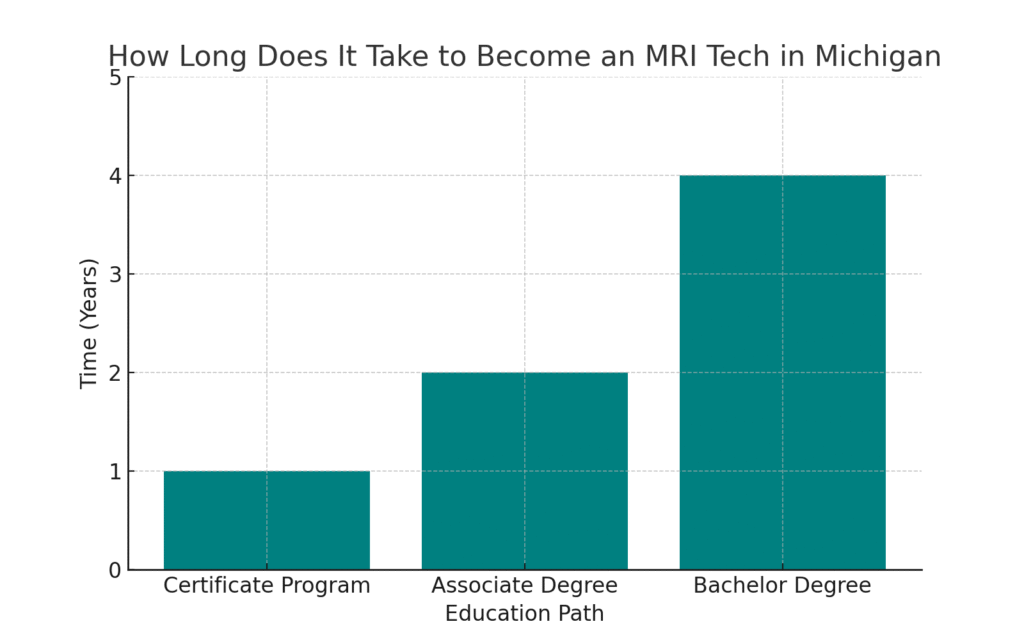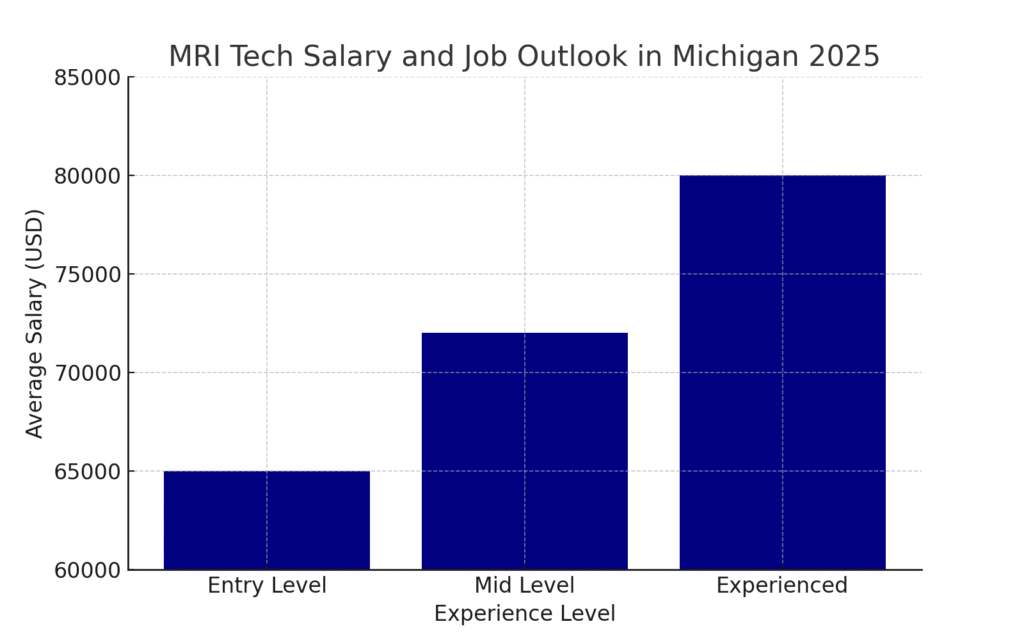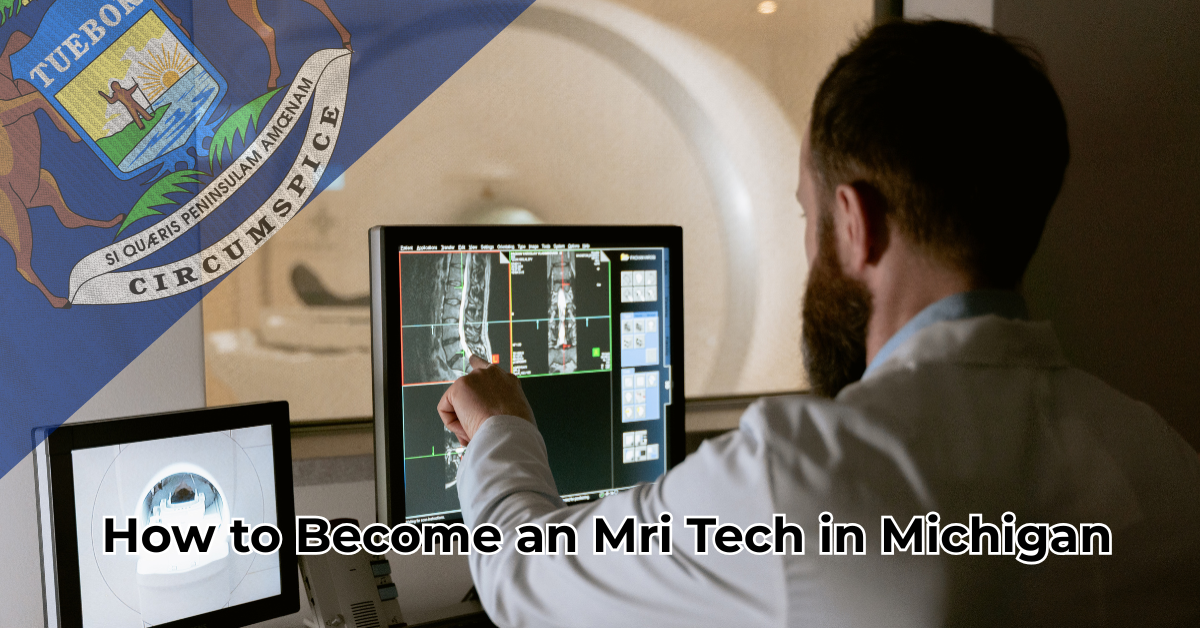The healthcare sector in Michigan is on the rise, and one of the more rewarding career opportunities in the industry includes becoming an MRI technologist.
MRI techs are crucial to contemporary medicine because they work with magnetic resonance imaging machines to assist physicians in diagnosing and treating all kinds of diseases.
Having developed hospitals, increasing imaging centers, and reasonable remuneration, Michigan presents good opportunities to those who desire to join this profession. This career, with its combination of job security and the opportunity to truly impact patients’ lives, is a great choice.
Education Requirements to Become an MRI Tech in Michigan
The first step toward becoming an MRI technologist in Michigan is meeting the educational requirements. Most employers and state regulations require candidates to complete an accredited MRI technology program or a radiologic technology degree with a specialization in MRI.
Community colleges, universities, and technical schools across Michigan usually offer these programs. Students can expect to study anatomy, medical terminology, patient care techniques, and imaging physics.
Besides the classroom training, practical clinical training is necessary. Michigan programs focus on hospital and imaging center clinical rotations, which provide students with the opportunity to work with patients under supervision. Such practical experience makes graduates ready to face the challenges in the workplace.
The curriculum of many Michigan schools is also structured such that it satisfies the requirements of the American Registry of Radiologic Technologists, which one must pass to obtain certification upon graduation.
MRI Tech Programs and Certification in Michigan 2025 Guide
After you graduate with a minimal education, you can then register for an MRI tech program that accrediting bodies have recognized. In Michigan, several colleges and technical schools offer specialized MRI training programs that provide not only classroom instruction but also hands-on practical experience.
Such programs usually last between one and two years, depending on whether you are doing a certificate, associate degree, or even a bachelor’s degree.
Once you finish your education, you will be required to acquire a certification to make you a licensed professional. The best-known certification is that of the American Registry of Radiologic Technologists.
To be eligible, you would have to pass an exam that involves patient safety, image production, and MRI procedures. Certification not only gives testament to your ability, but also escalates your prospects of getting a job in competitive Michigan hospitals and imaging centres.
Other employers might have even more requirements for further credentials in advanced imaging or continuing education, which could further boost your career development.
How Long Does It Take to Become an MRI Tech in Michigan
The time required to become an MRI technologist in Michigan depends on your chosen educational path. If you start with a certificate program, it may take about one year of full-time study.
An associate degree typically takes two years to complete, while a bachelor’s degree can take up to four years. Many students choose the associate degree route because it strikes a balance between time, cost, and career opportunities.

After graduation, you must also account for the time needed to prepare for and pass the certification exam. In total, most students spend two to three years from the beginning of their education to the point where they are fully certified and ready to work as MRI techs.
This timeline can vary if you pursue part-time education or already have prior experience in radiologic technology. The investment of time is well worth it, as Michigan’s growing healthcare system offers a strong job outlook and long-term career stability for certified MRI technologists.
MRI Tech Salary and Job Outlook in Michigan 2025
MRI technologists in Michigan enjoy competitive salaries and strong employment prospects. On average, an MRI tech can expect to earn between sixty-five thousand and eighty thousand dollars annually, depending on experience, location, and the type of healthcare facility.
Larger hospitals and specialized imaging centers often offer higher salaries along with benefits such as health insurance, retirement plans, and paid leave.

MRI techs have a bright future in Michigan. Advanced imaging services are in demand since the population is aging, and technology has been changing in the field of healthcare.
Current labor statistics show that the number of MRI technologist employment opportunities will keep increasing throughout the decade. This expansion offers job security as well as a chance to climb the ladder as a supervisor or even a specialized imaging position.
MRI technicians can maximize the full potential of their careers and stay relevant in the Michigan healthcare market by maintaining certification and pursuing continuing education.
Steps to Start Your Career as an MRI Tech in Michigan
Starting a career as an MRI technologist in Michigan involves several key steps. First, complete an accredited educational program in MRI technology or radiologic technology with an MRI focus.
Next, gain hands-on clinical experience through internships or rotations offered by your school. This experience is critical for building practical skills and confidence in patient care and imaging procedures.
After completing your education and training, take the certification exam provided by the American Registry of Radiologic Technologists. To be able to work as an MRI technologist in Michigan, it is necessary to pass this exam to be able to work legally.
Once certified, start submitting your applications to hospitals, clinics, and imaging facilities, and customize your resume and emphasize your academic credentials along with clinical experience. Meeting other professionals in the field and becoming a member of state or national radiologic associations may also be beneficial opportunities and resources as you begin your career.
Conclusion
Becoming an MRI technologist in Michigan is a rewarding journey that combines technical expertise with patient care. By completing the required education, gaining hands-on clinical experience, and earning certification, you can establish a stable and fulfilling career in the healthcare industry.
Michigan’s growing demand for imaging professionals, competitive salaries, and opportunities for career advancement make this path highly attractive.
You can be a newly graduated student who has entered the educational process, or you can be somebody who wants to shift to a specialized healthcare position; in either case, by following these steps, you will be able to reach your ultimate goal of becoming a certified MRI technologist.
To continue growing professionally, it is also possible to update yourself with ongoing education, keep your certification, and learn new skills in advanced imaging techniques. Through hard work and perseverance, you can also have a successful career that will not only provide you with a stable income but also enable you to contribute to the lives of patients within the state of Michigan in a meaningful way.
FAQs
How much do MRI techs make in Michigan?
MRI technologists in Michigan earn between $65,000 and $80,000 per year on average. Salaries vary depending on experience, location, and type of healthcare facility. Experienced MRI techs in large hospitals or specialized imaging centers can earn higher pay.
What is the fastest way to become an MRI tech?
The quickest path is completing a one-year accredited MRI certificate program after earning a basic radiologic or healthcare degree. Hands-on clinical training during the program prepares you for certification. After passing the American Registry of Radiologic Technologists exam, you can start working as an MRI tech.
How fast can you become an MRI tech?
Becoming an MRI technologist typically takes two to three years, including education, clinical training, and certification. Certificate programs may take one year, while an associate degree generally takes two years. Additional time for exam preparation and certification is also required before starting your career.

